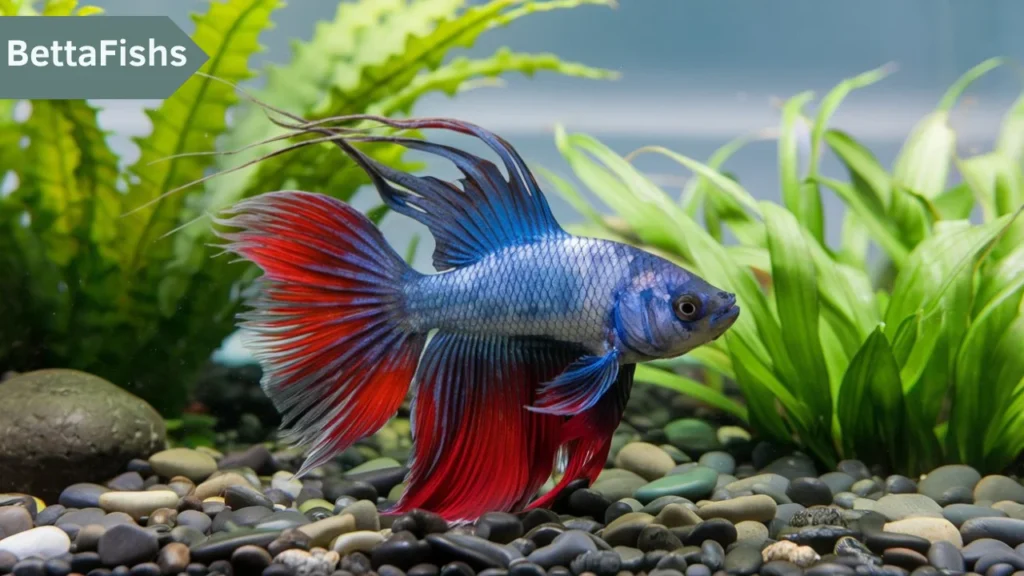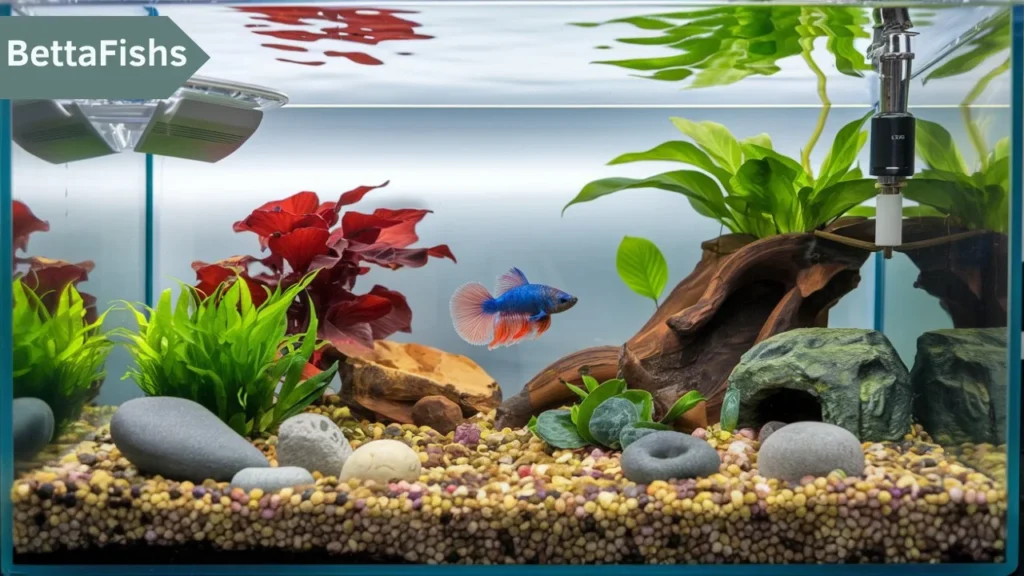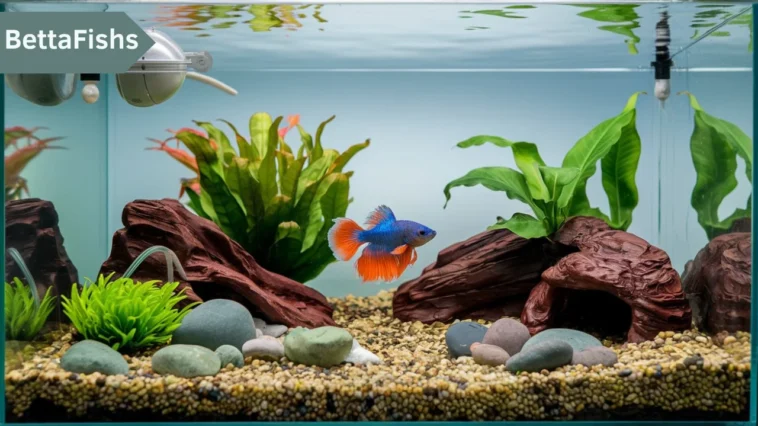Siamese fighting fish also referred to as betta fish, are among the most popular aquarium species. Known for their vibrant colors and flowing fins, these fish are not just beautiful but also have unique personalities that make them intriguing pets. The average lifespan of a male betta fish is crucial for owners who want to provide the best care and ensure a long, healthy life for their aquatic friend. In this article, we cover ” Average lifespan of a male Betta fish ” in detail.
What is a Betta Fish?
The shallow waters of Thailand, Cambodia, and Vietnam are the native habitat of betta fish. There are several species of bettas, but the Betta splendens is the most common in the aquarium trade. Male bettas are particularly known for their vivid colors, ranging from deep blues and reds to purples and greens, and they have longer, more flowing fins compared to females.
Average Lifespan of Betta Fish
On average, betta fish live for about 3 to 5 years in captivity. However, this can vary based on several factors, including genetics, environment, and the quality of care they receive. Some bettas may live longer with optimal care, while others may have shorter lifespans due to neglect or poor conditions.
Differences Between Male and Female Betta Fish Lifespan
While both male and female betta fish have similar lifespans, there are subtle differences influenced by their anatomy and behavior. Male bettas tend to have more vibrant colors and longer fins, which, although beautiful, can sometimes lead to increased susceptibility to injuries and infections. Female bettas, on the other hand, are less flamboyant but generally hardier in terms of health.
Factors Affecting the Lifespan of Male Betta Fish
Genetics
Genetics plays a significant role in determining the lifespan of a male betta fish. Fish from a healthy lineage with no history of diseases tend to live longer. Breeding practices also affect the genetic makeup, with selectively bred bettas sometimes experiencing health issues that can reduce their lifespan.
Tank Environment
The environment where a betta lives significantly impacts its lifespan. A well-maintained tank with proper filtration, heating, and regular water changes is essential. Bettas are tropical fish, so maintaining a consistent water temperature between 76-82°F (24-28°C) is crucial for their well-being.
Diet and Nutrition
A balanced diet is key to a betta’s health and longevity. Because they are carnivores, bettas do best on a diet high in protein. High-quality betta pellets, and frozen or live food such as bloodworms, daphnia, and brine shrimp are ideal. Underfeeding can result in malnutrition, while overfeeding can cause obesity and other health issues.
Stress Levels and Tank Mates
Stress is a silent killer for bettas. Factors such as a cramped tank, poor water quality, and incompatible tank mates can cause stress. Male bettas are known for their aggressive nature, especially towards other males and similarly colored fish. It’s best to keep them in a solitary tank or with peaceful species that do not provoke aggression.
Ideal Tank Setup for Prolonging Betta Fish Lifespan
Tank Size and Water Quality
A spacious tank of at least 5 gallons is recommended for a single male betta. This size provides ample room for swimming and reduces the accumulation of toxins in the water. Regular water changes are necessary to maintain water quality and prevent the buildup of harmful substances like ammonia and nitrates.
Filtration and Heating
A gentle filter is ideal for betta tanks as strong currents can stress them. Additionally, a heater is crucial to maintain the warm water temperatures that bettas need to thrive. Consistent water conditions mimic their natural habitat and reduce the risk of diseases.
Plants and Decorations
Live or silk plants and decorations provide hiding spots and reduce stress by creating a natural environment. Steer clear of anything sharp that might rip their fragile fins. Bettas enjoy exploring their surroundings, so providing a stimulating environment is beneficial.

Importance of Water Quality in Betta Fish Longevity
pH Levels and Water Hardness
Betta fish prefer slightly acidic to neutral water with a pH between 6.5 and 7.5. Water hardness should also be considered, as overly hard water can stress bettas and lead to health issues. Regularly testing the water and making adjustments as needed is key to maintaining optimal water conditions.
Regular Water Changes and Maintenance
Changing 25-30% of the water weekly helps remove toxins and maintain water quality. It’s also important to clean the tank and any decorations to prevent algae growth and other contaminants that could harm the betta.
Feeding Guidelines for Male Betta Fish
A varied diet ensures bettas receive all necessary nutrients. Feeding small portions two to three times daily is ideal. Overfeeding can cause bloating and digestive issues, so monitor the betta’s eating habits and adjust as needed. Uneaten food should be removed promptly to prevent water contamination.
Recognizing and Preventing Common Betta Fish Diseases
Symptoms of Common Diseases
Common diseases in bettas include fin rot, ich, and velvet. Symptoms like clamped fins, white spots, or lethargy indicate a problem. Early detection and treatment are crucial to prevent the spread of disease and ensure the fish’s recovery.
Preventative Measures
Maintaining a clean tank, providing a balanced diet, and reducing stress are the best ways to prevent diseases. Quarantining new fish and regularly inspecting your betta for signs of illness can also help maintain a healthy tank environment.
Treatment Options
For treating diseases, aquarium stores offer medications that can be added to the water. Follow the instructions carefully and, if possible, consult with a vet who specializes in fish to determine the best treatment plan.
How to Handle Stress in Betta Fish
Causes of Stress in Bettas
Stress in bettas can be caused by sudden changes in their environment, aggressive tank mates, or poor water conditions. Recognizing these stressors early can help you make necessary adjustments to your care routine.
Tips to Reduce Stress and Improve Well-being
Providing a stable environment, maintaining water quality, and minimizing aggressive interactions are crucial to reducing stress. Ensuring that the tank is well-decorated with plenty of hiding spots can also help the betta feel secure.
Signs of Aging in Male Betta Fish
As bettas age, they may become less active, their colors may fade, and their fins may appear frayed or clamped. Understanding these signs helps owners provide proper care and comfort as the betta approaches the end of its life.
How to Enhance the Lifespan of a Male Betta Fish
Best Practices for Daily Care
Regular feeding, monitoring water quality, and observing the betta’s behavior are all part of daily care. Providing a variety of foods and maintaining a clean tank are essential for the fish’s health and longevity.
Environmental Enrichment and Stimulation
Adding toys, mirrors, and safe objects for the betta to explore can provide mental stimulation. Bettas are curious creatures, and enrichment activities can enhance their quality of life.

Common Myths About Betta Fish Lifespan
There are many misconceptions about betta fish, such as the belief that they can live in small bowls or don’t need filtration. Dispelling these myths is important for ensuring that bettas are cared for properly and can live long healthy lives.
Comparing the Lifespan of Betta Fish with Other Aquarium Fish
Compared to other popular aquarium fish, bettas have a moderate lifespan. Goldfish, for example, can live over 10 years, while guppies may only live for 2 to 3 years. Understanding these differences helps set realistic expectations for betta fish owners.
Conclusion
Caring for a male betta fish requires dedication and attention to detail, but the reward is a vibrant, engaging pet that can bring joy for several years. By understanding their needs and creating a supportive environment, you can help ensure your betta fish lives a long, healthy life.
FAQs
How long can a betta fish live without a filter?
Betta fish can survive without a filter for a short time, but it’s not ideal for their health. Filters help maintain water quality by removing toxins, so using one is highly recommended.
What should I do if my betta fish stops eating?
If your betta fish stops eating, check the water quality and temperature first. Stress, illness, and poor water conditions are common reasons for appetite loss. If the issue persists, consult a vet.
Can male betta fish live with other fish?
Male betta fish can live with other non-aggressive, peaceful species, but it’s important to choose tank mates carefully to avoid stress and aggression.
How often should I clean my betta fish tank?
A betta fish tank should be cleaned weekly with a partial water change of 25-30% to maintain water quality and prevent the buildup of harmful substances.
Is it normal for a betta fish to be inactive?
While bettas do have rest periods, prolonged inactivity could indicate stress, poor water conditions, or illness. Observing their behavior and adjusting care as needed is essential.





One Comment
Leave a ReplyOne Ping
Pingback:How big do female Betta fish get?